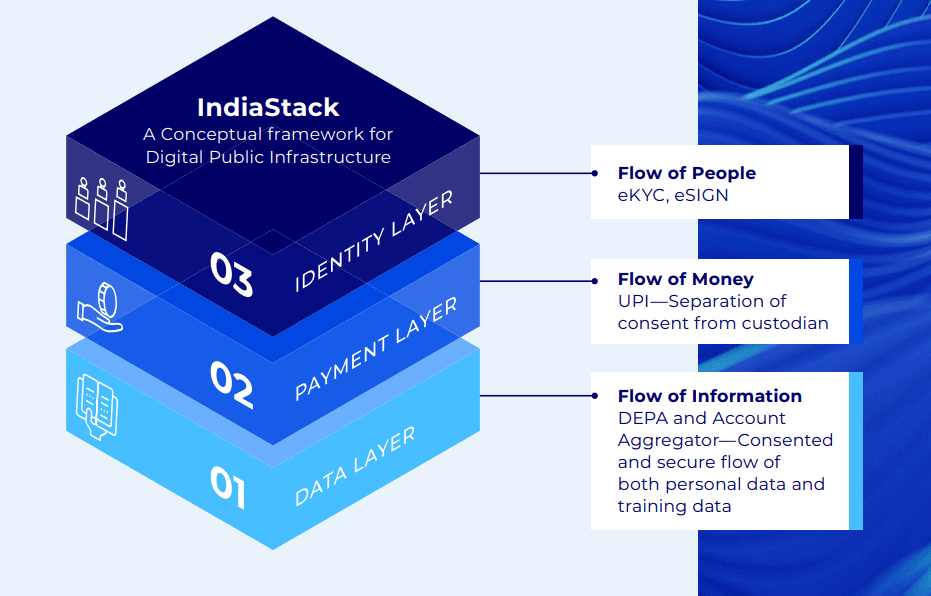- Home
- News And Events
- News
- Enabling A Thriving Data Economy With Digital Public Infrastructures
Enabling a Thriving Data Economy with Digital Public Infrastructures

In the 12th paper of the Digital Revolution and New Social Contract research program, we examine the lessons from India’s digital journey to learn how Digital Public Infrastructures (DPIs) can help unlock the latent potential of the data economy while ensuring the safety of all participants.
In modern societies, economic dynamics are shaped by three, highly interconnected flow components: the flow of people, the flow money, and the flow of information. Managing their interplay, therefore, is crucial to develop the digital infrastructure needed to address the interlocking challenges of tomorrow. But how can governments ensure that this infrastructure can be sufficiently scalable, sustainable, and flexible? The All-Government and Big Tech approaches have both evidenced their flaws in enabling a truly thriving data economy. However, a third alternative, Digital Public Infrastructures (DPIs), may hold the key to encourage innovation and foster competition by striking a balance between public and private interests. In our latest paper, researchers from the Indian Software product Industry Roundtable (ISPIRT) lay out a conceptual framework for DPIs and explore the foundational components of India Stack, the country’s revolutionary DPI platform.
What makes India’s DPI ecosystem stand out is its integrated building-blocks approach, its widespread adoption across society, and the way it has empowered citizens and businesses via unprecedented financial inclusion, rapid innovation, and consistent GDP growth.
India Stack epitomizes a paradigm shift in the way nations leverage digital infrastructure to improve citizens’ quality of life, enhance operational efficiencies, and foster innovation. Thanks to its minimalist design, interoperable components, and open networks, the platform has achieved widespread acceptance and encouraged the emergence of innovative use cases around each of its three layers: identity, payments, and data (see Figure 1). In turn, this has resulted in a myriad of social and economic benefits for the Indian population, including greater financial inclusion, more efficient and transparent delivery of public services, and a fertile ground for innovation and entrepreneurship. However, there have also been criticisms around the likelihood that they might succumb to monopolization and weaponization, urging the government to introduce a robust regulatory framework to protect users privacy and security.
Figure 1: India Stack's three layers

With all its successes and challenges, India’s experience in building a DPI ecosystem offers valuable lessons for other countries looking to embark on a similar journey. India Stack has completely reshaped the relationship between the government, businesses, and individuals and it has played a crucial role in enabling the country’s nascent data economy without trampling on users’ privacy and security. The platform has delivered positive on-the-ground impact and brought millions of Indians into the digital age, leapfrogging through technologies to enable a faster catch up. To enable a thriving data economy, four crucial pillars must come together:
- Sponsor-Regulator: The successful implementation of DPIs requires a cohesive and collaborative relationship between the government, i.e., the primary sponsor, and the various regulatory bodies.
- Ecosystem Managers: DPIs work best when each layer is managed by an independent body responsible for promoting the application, maintaining the different platform components, and ensuring that regulatory guidelines are followed.
- System Integrators: DPIs must also allow for a high degree of private-sector participation to ensure the various components work together seamlessly and cater users’ needs, thus ensuring a streamlined adoption.
- Public Tech: Keeping the technology architecture minimalistic and standards-driven while embedding a techno-legal framework that inherently safeguards data privacy ensures that DPIs are kept scalable, sustainable, and adaptable.
Notwithstanding the inherent risks, a well-designed DPI ecosystem that builds interoperability and adequate safeguards for data governance and security can not only unlock the latent potential of the data economy but also contribute to develop a new ‘digital social contract’ through greater inclusion and citizen empowerment.